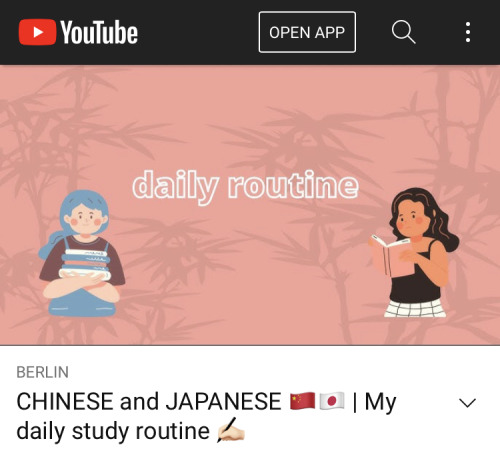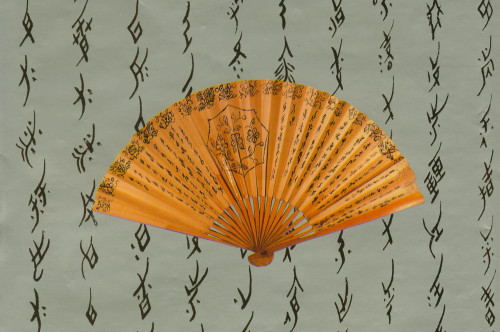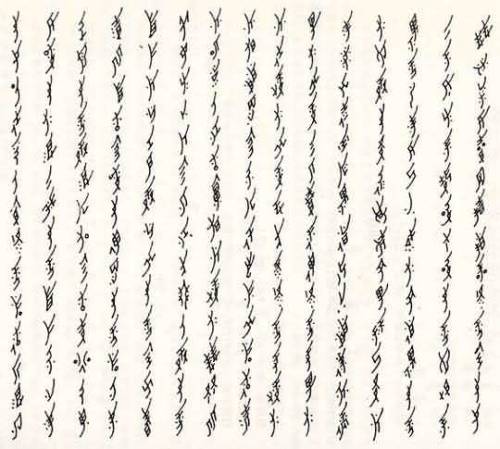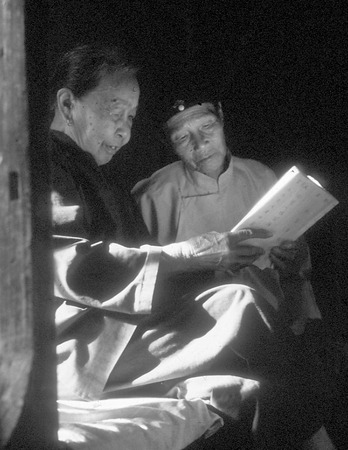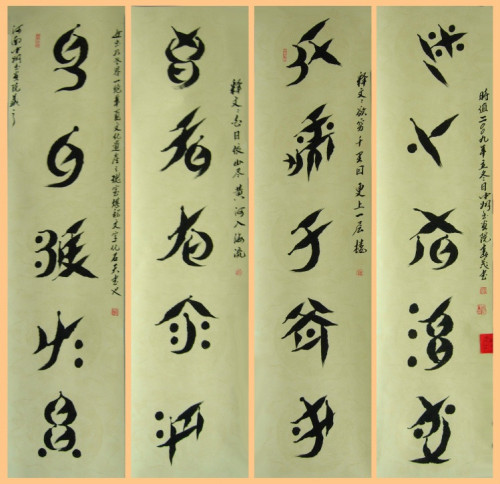#chinese language

Modern Chinese have developed the habit of using the character 死 sǐ (die) to spice up their colloquial expressions. Let’s take a closer look to see what we can learn from these colorful language extremes. Often these “dying” expressions are used to express negative feelings with lighthearted charm…
饿死了è sǐ le – extremely hungry
渴死了kě sǐ le – extremely thirsty
吓死我了xià sǐ wǒ le – frightened me to death
疼死了téng sǐ le – to really hurt
热死了rè sǐ le – unbearably hot
冷死了lěng sǐ le – unbearably cold
累死了lèi sǐ le – dying from overwork
堵死了dǔ sǐ le – blocked road; plugged hole
烦死了 fán sǐ le – annoyed to death
困死了kùn sǐ le – incredibly sleepy
气死我了qì sǐ wǒ le – infuriating me
无聊死了wúliáo sǐle – bored to death
Continue Reading

When you face a moment where it would help to dish out a compliment, say to a male partner or a friend or a friend’s son, China Simplified wants you to be armed and ready!
The current trendy expressions – 小鲜肉 xiǎo xiān ròu a hot guy (lit. little fresh meat), 男神 nán shén male god, and 高富帅 gāofù shuài tall, rich and handsome – are great among friends to show you know the latest pop culture sayings. In other settings, however, you may want to reach for a more sophisticated compliment, one able to communicate a degree of respect and intellectual substance.
Continue reading
Valentine’s Day is just around the corner. Let us help you make a good impression with the ladies with these timeless Chinese phrases.

Are you Chinese learner? Have you started reading books in Chinese? Or reading for a long time and what to share how awesome you are? 呵呵
I created this hashtag to inspire, to motivate and create a community full of people that read books in Chinese! We can talk about them, share info where we buy them, share reviews and… what are you waiting for? ADD a pic and TAG #omgireadinchinese and me! ❤️
我们一起加油!
Post link
Japanese and Chinese study time! [ & ]
Japanese studygram: himekostudies
Chinese studygram: zakuwatorka
Post link

Last time when I posted the list with my fav websites where you can practice reading in Chinese, so many of you liked it and shared it! I appreciate it so much… and decided to make something extra, add more websites I found useful during Chinese learning process.
~~~~~~~~~~~~~~~~ ♡ ~~~~~~~~~~~~~~~~
Reading in Chinese
♡Mandarin Bean (news in Chinese, HSK 1-6)
♡Chinese Reading Practice (stories, essays, legends, chengyu stories)
♡The Chairman’s Bao (news in Chinese, HSK 1-6)
♡HSK Reading (and more articles!)
♡My Chinese Reading (stories, scientific, business/politics, history etc)
♡BBC News in Chinese (for more advanced learners)
♡ + Baidu Baike (something like Chinese wikipedia)
Grammar and HSK websites
♡Chinese Grammar Wiki (saved my as… I mean my life MANY times)
♡HSK Online (perfect place to test yourself, learn new words and gain a lot of knowledge how HSK looks like)
Online courses
♡Courses on Coursera (recommend these courses created by Peking University)
Online Dictionaries
♡ Pleco (APP)
♡Bohan (for ppl)
YouTubers
Teachers:
♡ Learning Chinese through Stories
♡HSK Test Preparation and Practice
Chinese vloggers
Foreigners in/about China
♡Weronika Truszczyńska (Polish vlogger, her shoots are incredible; there are English subs)
Online Bookstores
Where you can watch Chinese drama/movies/cartoons?
♡ YouTube (try to type the Chinese title, high possibilities it will show up!
fe.THEY have quite a lot of dramas ;>
♡ Netflix -> Taiwan on Netflix +Movies from Mainland China on Netflix
~~~~~~~~~~~~~~~~ ♡ ~~~~~~~~~~~~~~~~
♡ If you liked this post please like, share! ♡
You can also:
♡ follow me on Instagram
♡ and subscribe my YouTube channel
Nüshu, the only gender-specific writing system in the world
Nüshu (女书; literally “women’s writing”), is a syllabic script, a simplification of Chinese characters created and used exclusively by women in the Jiangyong County in Hunan province. It remains the only gender-specific writing system in the world.
Unlike the standard written Chinese, which is logographic, Nüshu is phonetic, with each of its approximately 600-700 characters representing a syllable. This is about half the number required to represent all the syllables in the local variety of spoken Chinese as tonal distinctions are frequently ignored. In that sense, Nüshu is the most revolutionary and thorough simplification of Chinese characters ever attempted. Zhou Shuoyi, described as the only male to have mastered the script, compiled a dictionary listing 1,800 variant characters and allographs.
In the sex-segregated traditional China, girls and women did not have the same access to literacy as boys and men, though throughout China’s history, there were always women who could read and write. Most people - male or female - were illiterate. Reforms of the early 20th century, which popularized education and promulgated a writing style reflective of speech (baihuawen) to replace the arcane literary style (wenyanwen), increased literacy rates for both males and females. It is not known when or how Nüshu came into being, but, because it is clearly based in the standard Chinese script, hanzi, Nüshu could not have been created before standardization of hanzi (circa 900). Many of the simplifications found in Nüshu have been in informal use in standard Chinese since the SongandYuan dynasty (13th - 14th century). The script seems to have reached its peak during the latter part of the Qing Dynasty(1644–1911).
The script was suppressed by the Japanese during their invasion of China in the 1930’s-40’s, because they feared that the Chinese could use it to send secret messages, and also during the Cultural Revolution. It is no longer customary for women to learn Nüshu, and literacy in Nüshu is now limited to a few scholars who learned it from the last women who were literate in it. The original writers of the script died in the 1990’s (the last one in 2004). However, after a recent documentary about Nüshu, the government has started to popularize the effort to preserve the increasingly endangered script, and some younger women are beginning to learn it.
Post link
Do you compulsively attach “lol” to 90% of text messages you send out? If yes, you are in good company (I’m also guilty of it), and after reading this post, you can “lol” in Chinese too!
We all know LOL in English is short for “Laughing Out Loud”, and in informal settings like texting or internet forums or social media, a “lol” can convey many different meanings, ranging from the simple “that’s funny” to a passive aggressive “I’m done with you”.
The Chinese equivalent of “lol” is “呵呵" (written same way in traditional Chinese), pronounced “hē hē”, and like “lol”, it’s also used for a wide variety of situations online, including passive aggressive social media comments.
The most notable difference between “呵呵” and “lol” is between the words themselves. “LOL” is an acronym of the description of laughing. “呵呵” is an onomatopoeia, and is more like “haha” in this regard.
A second slight difference is that while lol can be attached to beginning or ends of sentences as is, “呵呵” is usually separated from the rest of the sentence with a comma. Also, from personal experience, “呵呵” is now used more for sarcasm than to convey laughter, so it’s much more like “lol” in usage.
Finally, some fun stuff:
- The most notorious “呵呵” abuser in history was the poet Su shi (蘇軾). He’s famous for his epic and serious poems, but if his letters were any indication, dude was actually quite a mischievous person among his friends and family.
- Personally, I think the most modern usage of “呵呵” in history was in the Ming-era letter from a painter to his poet friend (picture below with “lol” circled in pink), which ran roughly as follows:
- “Read your latest work as a big fan, and I must say, you are way better than some famous poets of yore! I love it! But of course, those promises of royalties will mostly turn up empty, and you’ll only be seeing a couple hundred bucks at best lol. Anyway sorry for the brief reply, we can talk more in person”.
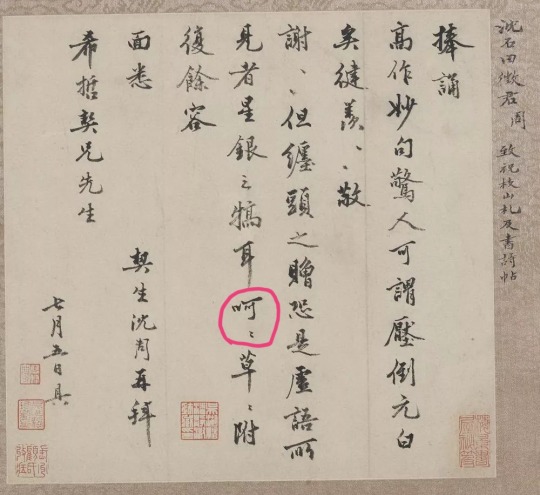
A Closer Look at Chinese Names
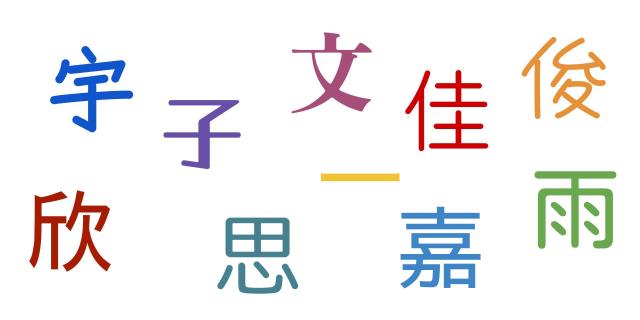
This post has been a long time coming. In spring 2020, I posted two of the most popular posts on this blog:
Reading Chinese Names: Female Names
Reading Chinese Names: Male Names
More recently I have wanted to revisit the idea behind those posts but with a different, more in-depth approach. I also made some decisions while compiling data for those posts that I now regret. So in late summer 2021, I set out to completely redo my data collection with the eventual goal of creating this very post.
About the Data
I will include more information about my data collection process at the end of this post for those interested.
I gathered 3,277 names (1602 male, 1675 female) from idol shows and groups. In the grand scheme of things, this is not a lot of names at all. But I think it’s enough that we can explore names, observe some generalities, and have fun! These names belong to individuals roughly 15-30 years old. Most names belong to individuals from Mainland China, but there are some Hong Konger and Taiwanese names as well.
Some of the name sources include:
- 偶像练习生/青春有你
- 创造101/创造营
- 明日之子
- 以团之名/少年之名
- SNH48
- 快乐女声/快乐男声
- 菱格世代DD52
- Various groups like 时代少年 and SING女团
I also wanted to note something important: the definitions I am using (via MDBG) are only the surface. For example, a name containing a character meaning jade might also have implications of beauty and virtue. So the meaning is more than just “jade.” However, it just isn’t practical to go into all the nitty gritty here. I encourage you to seek out more resources if you are interested.
Some Thanks
Thanks so much to @liu-anhuaming,@meichenxi, and my friend Tiffany for their help and advice during the process of creating this post! 非常感谢你们,你们是最棒的!
Given Names (Overall)

First let’s look at the most common characters for ALL the given names in the dataset. There were 1093 total unique characters across all the given names. I’m going to include more characters (almost rounding out the top 100) at the bottom of this post for those interested. There is also some information broken down by gender below.
Top Given Name Characters
- 宇 yǔ - room, universe / 87
- 子 zǐ - son, child, seed, egg, small thing, 1st earthly branch, midnight, 11th solar month, year of the Rat, fourth of five orders of nobility, ancient Chinese compass point / 82
- 佳 jiā - beautiful, fine, good / 68
- 雨 yǔ - rain / 63
- 嘉 jiā - excellent, auspicious, to praise, to commend / 59
- 文 wén - language, culture, writing, formal, literary, gentle / 58
- 欣 xīn - happy / 55
- 一 yī - one, 1, single, a (article), as soon as, entire, whole, all, throughout / 51
- 俊 jùn - smart, eminent, handsome, talented / 51
- 思 sī - to think, to consider / 49
- 杰 jié - hero, heroic, outstanding person, prominent, distinguished / 49
- 豪 háo - grand, heroic / 48
- 怡 yí - harmony, pleased / 45
- 天 tiān - day, sky, heaven / 44
- 泽 zé - pool, pond, (of metals etc) luster, favor or beneficence, damp, moist / 43
- 琪 qí - fine jade / 40
- 婷 tíng - graceful / 39
- 鑫 xīn - prosperity / 38
- 晓 xiǎo - dawn, daybreak, to know, to let sb know, to make explicit / 35
- 浩 hào - grand, vast (water) / 35
- 晨 chén - morning, dawn, daybreak / 34
- 恩 ēn - favor, grace, kindness / 33
- 博 bó - extensive, ample, rich, obtain, aim, to win, to get, plentiful / 32
- 慧 huì - intelligent / 32
- 明 míng - bright, clear, to understand, wise / 32
- 轩 xuān - pavilion with a view, high, tall / 32
- 辰 chén - 5th earthly branch, 3rd solar month, year of the Dragon, ancient Chinese compass point / 32
Top Given Name Characters (Female)
- 佳 jiā - beautiful, fine, good / 56
- 雨 yǔ - rain / 50
- 欣 xīn - happy / 49
- 怡 yí - harmony, pleased / 44
- 婷 tíng - graceful / 39
- 嘉 jiā - excellent, auspicious, to praise, to commend / 37
- 琪 qí - fine jade / 35
- 思 sī - to think, to consider / 33
- 慧 huì - intelligent / 31
- 梦 mèng - dream, to dream / 30
Top Given Name Characters (Male)
- 宇 yǔ - room, universe / 68
- 子 zǐ - son, child, seed, egg, small thing, 1st earthly branch, midnight, 11th solar month, year of the Rat, fourth of five orders of nobility, ancient Chinese compass point / 55
- 豪 háo - grand, heroic / 48
- 杰 jié - hero, heroic, outstanding person, prominent, distinguished / 47
- 俊 jùn - smart, eminent, handsome, talented / 45
- 泽 zé - pool, pond, (of metals etc) luster, favor or beneficence, damp, moist / 38
- 浩 hào - grand, vast (water) / 35
- 一 yī - one, 1, single, a (article), as soon as, entire, whole, all, throughout / 34
- 文 wén - language, culture, writing, formal, literary, gentle / 32
- 明 míng - bright, clear, to understand, wise / 27
Single-Character Names (单名)

There were 668 single-character names, which is about 20% of the total names. I know that 单名 are pretty rare in Taiwan (I’m not sure about Hong Kong), so that’s something to keep in mind. More of the top 单名 are at the bottom of this post.
Top Single-Character Names
- 鑫 xīn - prosperity / 12
- 欣 xīn - happy / 10
- 洋 yáng - ocean, vast, foreign, silver dollar or coin / 9
- 静 jìng - still, calm, quiet, not moving / 7
- 丹 dān - red, pellet, powder, cinnabar / 6
- 娜 nà - graceful, elegant, beautiful / 6
- 恩 ēn - favor, grace, kindness / 6
- 敏 mǐn - quick, nimble, agile, clever, smart / 6
- 昕 xīn - dawn / 6
- 雪 xuě - snow / 6
- 颖 yǐng - head of grain, husk, tip, point, clever, gifted, outstanding / 6
Female Single-Character Names
- 欣 xīn - happy / 9
- 鑫 xīn - prosperity / 8
- 静 jìng - still, calm, quiet, not moving / 7
- 丹 dān - red, pellet, powder, cinnabar / 6
- 娜 nà - graceful, elegant, beautiful / 6
- 敏 mǐn - quick, nimble, agile, clever, smart / 6
- 雪 xuě - snow / 6
- 倩 qiàn - pretty, winsome / 5
- 洁 jié - clean / 5
- 颖 yǐng - head of grain, husk, tip, point, clever, gifted, outstanding / 5
Male Single-Character Names
- 洋 yáng - ocean, vast, foreign, silver dollar or coin / 7
- 恩 ēn - favor, grace, kindness / 5
- 杰 jié - hero, heroic, outstanding person, prominent, distinguished / 5
- 宇 yǔ - room, universe / 4
- 浩 hào - grand, vast (water) / 4
- 涛 tāo - big wave / 4 (Taiwan pr. táo)
- 硕 shuò - large, big / 4
- 磊 lěi - lumpy, rock pile, uneven, sincere, open and honest / 4
- 立 lì - to stand, to set up, to establish, to lay down, to draw up, at once, immediately / 4
- 耀 yào - brilliant, glorious / 4
- 聪 cōng - wise, clever, sharp-witted, intelligent, acute, quick at hearing / 4
- 超 chāo - to exceed, to overtake, to surpass, to transcend, to pass, to cross, ultra, super / 4
- 鑫 xīn - prosperity / 4
- 鹏 péng - large fabulous bird / 4
Two-Character Names (双名)
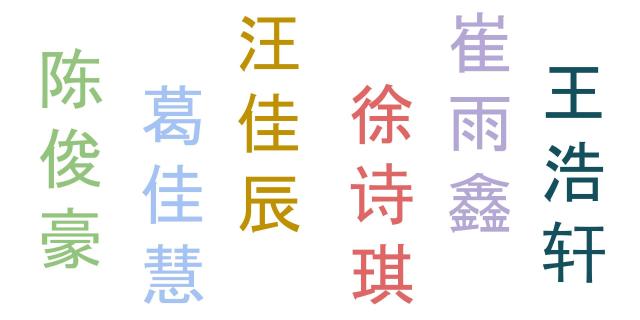
For the lists below, I removed all 单名 and just looked at 双名 characters. One of the things I was most excited to examine in this post was what characters tend to be found in the first vs. second positions. As you will see reflected below, some common characters used in names tend to occur more in one position, like 子 which is more prevalent in the first position. Others are more balanced. I bolded characters appearing in both positions.
Additional top 双名 can be found at the end of this post.
Top Two-Character Names
- 俊杰 jùnjié / 7
- 佳怡 jiāyí / 5
- 嘉欣 jiāxīn / 5
- 天宇 tiānyǔ / 5
- 浩然 hàorán / 5
- 婷婷 tíngtíng / 4
- 子杰 zǐjié / 4
- 安琪 ānqí / 4
Top First Characters
- 子 zǐ - son, child, seed, egg, small thing, 1st earthly branch, midnight, 11th solar month, year of the Rat, fourth of five orders of nobility, ancient Chinese compass point / 72
- 嘉 jiā - excellent, auspicious, to praise, to commend / 49
- 佳 jiā - beautiful, fine, good / 48
- 思 sī - to think, to consider / 44
- 一 yī - one, 1, single, a (article), as soon as, entire, whole, all, throughout / 40
- 俊 jùn - smart, eminent, handsome, talented / 40
- 雨 yǔ - rain / 36
- 天 tiān - day, sky, heaven / 34
- 宇 yǔ -room, universe / 34
- 晓 xiǎo - dawn, daybreak, to know, to let sb know, to make explicit / 34
Top Second Characters
- 宇 yǔ - room, universe / 48
- 豪 háo - grand, heroic / 45
- 杰 jié - hero, heroic, outstanding person, prominent, distinguished / 41
- 琪 qí - fine jade / 34
- 文 wén - language, culture, writing, formal, literary, gentle / 32
- 怡 yí - harmony, pleased / 30
- 婷 tíng - graceful / 29
- 轩 xuān - pavilion with a view, high, tall / 27
- 辰 chén - 5th earthly branch, 3rd solar month, year of the Dragon, ancient Chinese compass point / 26
- 欣 xīn - happy / 23
- 涵 hán - to contain, to include, culvert / 23
- 雨 yǔ - rain / 23
Female First Characters
- 佳 jiā - beautiful, fine, good / 38
- 嘉 jiā - excellent, auspicious, to praise, to commend / 31
- 思 sī - to think, to consider / 29
- 雨 yǔ - rain / 27
- 晓 xiǎo - dawn, daybreak, to know, to let sb know, to make explicit / 26
- 诗 shī - poem, poetry, verse / 24
- 梦 mèng - dream, to dream / 22
- 小 xiǎo - small, tiny, few, young / 20
- 欣 xīn - happy / 19
- 雅 yǎ - elegant / 19
Female Second Characters
- 琪 qí - fine jade / 30
- 婷 tíng - graceful / 29
- 怡 yí - harmony, pleased / 29
- 欣 xīn - happy / 21
- 雨 yǔ - rain / 21
- 君 jūn - monarch, lord, gentleman, ruler / 19
- 慧 huì - intelligent / 18
- 涵 hán - to contain, to include, culvert / 18
- 瑶 yáo - jade, precious stone, mother-of-pearl, nacre, precious / 17
- 莹 yíng - luster of gems / 16
Male First Characters
- 子 zǐ - son, child, seed, egg, small thing, 1st earthly branch, midnight, 11th solar month, year of the Rat, fourth of five orders of nobility, ancient Chinese compass point / 54
- 俊 jùn - smart, eminent, handsome, talented / 35
- 一 yī - one, 1, single, a (article), as soon as, entire, whole, all, throughout / 26
- 浩 hào - grand, vast (water) / 24
- 泽 zé - pool, pond, (of metals etc) luster, favor or beneficence, damp, moist / 22
- 宇 yǔ - room, universe / 20
- 明 míng - bright, clear, to understand, wise / 20
- 天 tiān - day, sky, heaven / 19
- 嘉 jiā - excellent, auspicious, to praise, to commend / 18
- 柏 bó - cedar, cypress / 17
Male Second Characters
- 豪 háo - grand, heroic / 45
- 宇 yǔ - room, universe / 44
- 杰 jié - hero, heroic, outstanding person, prominent, distinguished / 40
- 轩 xuān - pavilion with a view, high, tall / 21
- 辰 chén - 5th earthly branch, 3rd solar month, year of the Dragon, ancient Chinese compass point / 20
- 翔 xiáng - to soar, to glide / 19
- 文 wén - language, culture, writing, formal, literary, gentle / 17
- 霖 lín - continued rain / 17
- 铭 míng - to engrave, inscribed motto / 15
- 泽 zé - pool, pond, (of metals etc) luster, favor or beneficence, damp, moist / 14
- 鑫 xīn - prosperity / 14
- 龙 lóng - dragon, imperial / 14
Comparing Characters by Position

After examining the most popular characters by position, I was curious to look more specifically at which characters appear in one position but not the other. In this section I decided not to include lists separated by gender because it was getting to be too much information.
Exclusively First Characters
Below are the top characters that never appeared in the second position.
- 晓 xiǎo - dawn, daybreak, to know, to let sb know, to make explicit / 34
- 小 xiǎo - small, tiny, few, young / 24
- 紫 zǐ - purple, violet / 16
- 美 měi - beautiful, very satisfactory, good, to beautify, to be pleased with oneself / 15
- 若 ruò - to seem, like, as if / 14
- 智 zhì - wisdom, knowledge / 13
- 书 shū - book, letter, document, to write / 11
- 婉 wǎn - graceful, tactful / 11
- 振 zhèn - to shake, to flap, to vibrate, to resonate, to rise up with spirit, to rouse oneself / 11
- 永 yǒng - forever, always, perpetual / 11
- 秋 qiū - autumn, fall, harvest time / 11
Largest Deltas (First Position)
I also wanted to see characters that were found in both positions but for which there was a big difference in occurrence. I bolded characters that appeared both here and in the list above.
The math is formatted:
# times first position - # times second position = difference
- 子 zǐ - son, child, seed, egg, small thing, 1st earthly branch, midnight, 11th solar month, year of the Rat, fourth of five orders of nobility, ancient Chinese compass point / 72 - 10 = 62
- 思 sī - to think, to consider / 44 - 4 = 40
- 嘉 jiā - excellent, auspicious, to praise, to commend / 49 - 10 = 39
- 晓 xiǎo - dawn, daybreak, to know, to let sb know, to make explicit / 34 - 0 = 34
- 佳 jiā - beautiful, fine, good / 48 - 15 = 33
- 一 yī - one, 1, single, a (article), as soon as, entire, whole, all, throughout / 40 - 9 = 31
- 俊 jùn - smart, eminent, handsome, talented / 40 - 9 = 31
- 天 tiān - day, sky, heaven / 34 - 7 = 27
- 小 xiǎo - small, tiny, few, young / 24 - 0 = 24
- 诗 shī - poem, poetry, verse / 24 - 2 = 22
Exclusively Second Characters
- 豪 háo - grand, heroic / 45
- 霖 lín - continued rain / 22
- 然 rán - correct, right, so, thus, like this / 20
- 琦 qí - curio, valuable stone / 17
- 仪 yí - apparatus, rites, appearance, present, ceremony / 14
- 航 háng - boat, ship, craft, to navigate, to sail, to fly / 13
- 晴 qíng - clear, fine (weather) / 12
- 萱 xuān - orange day-lily / 12
- 帆 fān - sail, to gallop / 11 (Taiwan pr. fán)
- 璇 xuán - jade / 9
Largest Deltas (Second Position)
- 豪 háo - grand, heroic / 45 - 0 = 45
- 杰 jié - hero, heroic, outstanding person, prominent, distinguished / 41 - 3 = 38
- 琪 qí - fine jade / 34 - 2 = 32
- 婷 tíng - graceful / 29 - 6 = 23
- 辰 chén - 5th earthly branch, 3rd solar month, year of the Dragon, ancient Chinese compass point / 26 - 3 = 23
- 轩 xuān - pavilion with a view, high, tall / 27 - 5 = 22
- 霖 lín - continued rain / 22 - 0 = 22
- 涵 hán - to contain, to include, culvert / 23 - 2 = 21
- 然 rán - correct, right, so, thus, like this / 20 - 0 = 20
- 怡 yí - harmony, pleased / 30 - 13 = 17
- 君 jūn - monarch, lord, gentleman, ruler / 22 - 5 = 17
- 琦 qí - curio, valuable stone / 17 - 0 = 17
Gender Associations of Characters

This section is more experimental and exploratory. There are probably better ways to examine the gender association for characters, but I just wanted to take a quick look for fun, not develop a whole new analysis technique.
Gender Neutral Characters
Here I simply took the average of the ranks of each character for male names and female names. If a character was only found in male names or only found in female names, it would just end up with the overall rank of N/A.
The math is formatted:
(Female names rank + male names rank) ÷ 2 = average rank
- 子 zǐ - son, child, seed, egg, small thing, 1st earthly branch, midnight, 11th solar month, year of the Rat, fourth of five orders of nobility, ancient Chinese compass point
(12th + 2nd) ÷ 2 = 7th (82 times) - 嘉 jiā - excellent, auspicious, to praise, to commend
(6th + 18th) ÷ 2 = 12th (59 times) - 文 wén - language, culture, writing, formal, literary, gentle
(15th + 9th) ÷ 2 = 12th (58 times) - 宇 yǔ - room, universe
(30th + 1st) ÷ 2 = 15.5th (87 times) - 思 sī - to think, to consider
(8th + 29th) ÷ 2 = 18.5th (49 times) - 一 yī - one, 1, single, a (article), as soon as, entire, whole, all, throughout
(34th + 8th) ÷ 2 = 21st (51 times) - 天 tiān - day, sky, heaven
(31st + 12th) ÷ 2 = 21.5th (44 times) - 雨 yǔ - rain
(2nd + 45th) ÷ 2 = 23.5th (63 times) - 佳 jiā - beautiful, fine, good
(1st + 47th) ÷ 2 = 24th (68 times) - 恩 ēn - favor, grace, kindness
(37th + 30th) ÷ 2 = 33.5th (33 times)
Female-Leaning Characters
For this section, I looked at characters in female names that did not appear in male names. This isn’t a perfect technique, but I think it is still interesting to see the results.
- 婷 tíng - graceful / 5th (39 times)
- 诗 shī - poem, poetry, verse / 16th (26 times)
- 静 jìng - still, calm, quiet, not moving / 18th (23 times)
- 莹 yíng - luster of gems / 28th (20 times)
- 丽 lì - beautiful / 29th (19 times)
- 依 yī - to depend on, to comply with or listen to sb, according to, in the light of / 35th (17 times)
- 妍 yán - beautiful / 36th (17 times)
- 媛 yuán - beautiful / 40th (16 times)
- 月 yuè - moon, month / 41st (16 times)
- 紫 zǐ - purple, violet / 43rd (16 times)
Male-Leaning Characters
Likewise, for this section I chose characters that appeared in male names but not female names. I actually know women with 龙 and 伟 in their names, so it’s important to remember that leaning male =/= only found in men’s names. There are always exceptions!
- 豪 háo - grand, heroic / 3rd (48 times)
- 浩 hào - grand, vast (water) / 7th (35 times)
- 龙 lóng - dragon, imperial / 28th (17 times)
- 伟 wěi - big, large, great / 36th (14 times)
- 峻 jùn - (of mountains) high, harsh or severe / 38th (13 times)
- 耀 yào - brilliant, glorious / 42nd (13 times)
- 钧 jūn - 30 catties, great, your (honorific) / 44th (13 times)
- 成 chéng - to succeed, to finish, to complete, to accomplish, to become, to turn into, to be all right, one tenth / 48th (12 times)
- 振 zhèn - to shake, to flap, to vibrate, to resonate, to rise up with spirit, to rouse oneself / 53rd (11 times)
- 飞 fēi - to fly / 54th (11 times)
While looking at gender was fun, in the future I’d really like to look at tones/tone combinations, open vs. close syllables, and more. I’m still thinking about the best way to do this.
Surnames
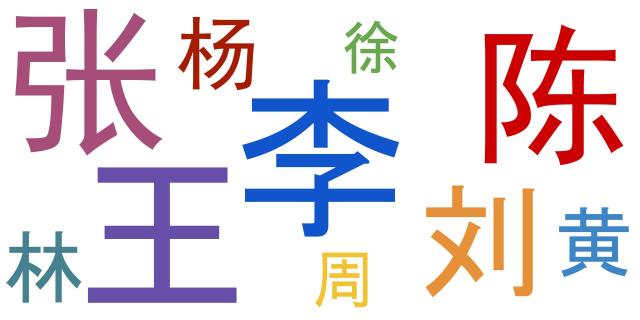
Since surname rankings are actually known, I thought it would be interesting to briefly compare my dataset to the true populations.
Top Surnames
- 李 Lǐ / 240
- 王 Wáng / 206
- 张 Zhāng / 186
- 陈 Chén / 173
- 刘 Liú / 147
- 杨 Yáng / 94
- 林 Lín / 91
- 黄 Huáng / 88
- 周 Zhōu / 69
- 徐 Xú / 66
Mainland Top Surnames
- 李 Lǐ
- 王 Wáng
- 张 Zhāng
- 刘 Liú
- 陈 Chén
- 杨 Yáng
- 赵 Zhào
- 黄 Huáng
- 周 Zhōu
- 吴 Wú
Taiwan Top Surnames
- 陈 Chén
- 林 Lín
- 黄 Huáng
- 张 Zhāng
- 李 Lǐ
- 王 Wáng
- 吴 Wú
- 刘 Liú
- 蔡 Cài
- 杨 Yáng
What stood out to me most was 林 making #7 on my list. I suspect this is due to the inclusion of Taiwanese names. In Mainland China it actually ranks around #16 I believe. 赵 didn’t make the top 10, but I think it was actually #11, so that’s not too far off.
About the Data Cont’
For my original posts 1.5 years ago, I had difficulty maintaining a gender balance and decided to add male names from other types of sources as a supplement. I have since regretted that choice, so this time I worked hard to maintain balance without using unrelated sources. One result of this is that there are names in the original dataset that do not appear in this dataset, so even though the new dataset has more names, it’s possible that there could be fewer occurrences of some characters.
I did my best to remove duplicate individuals (not duplicate names!) and remove stage names that do not sound like real names (or replace them with real names). However, I did not try to swap out all stage names for birth names because that would have been too difficult and time consuming. I also made the assumption that any four-character name could be segmented into two surname characters and two given name characters.
It’s important to note that these names are not necessarily representative of the 15-30 population as a whole. Idols or trainees might change their names to something sounding more cool or hip, and like I mentioned, it simply wasn’t feasible for me to find everyone’s birth name. And my data collection didn’t take into account things like geography/population spread or keep track of ages (but I did for the most part avoid any shows older than 5 years and groups with members 30+).
Extended Lists
Top Given Name Characters
28 星 xīng - star, heavenly body / 31
29 梦 mèng - dream, to dream / 31
30 倩 qiàn - pretty, winsome / 29
31 涵 hán - to contain, to include, culvert / 29
32 艺 yì - skill, art / 29
33 雅 yǎ - elegant / 29
34 雪 xuě - snow / 29
35 君 jūn - monarch, lord, gentleman, ruler / 28
36 翔 xiáng - to soar, to glide / 27
37 霖 lín - continued rain / 27
38 哲 zhé - wise, a sage / 26
39 梓 zǐ - Catalpa kaempferi (type of tree), printing blocks / 26
40 羽 yǔ - feather, 5th note in pentatonic scale / 26
41 诗 shī - poem, poetry, verse / 26
42 凯 kǎi - triumphant, victorious / 25
43 家 jiā - home, family / 24
44 小 xiǎo - small, tiny, few, young / 24
45 洋 yáng - ocean, vast, foreign, silver dollar or coin / 24
46 铭 míng - to engrave, inscribed motto / 24
47 奕 yì - abundant, graceful / 23
48 柏 bó - cedar, cypress / 23
49 静 jìng - still, calm, quiet, not moving / 23
50 馨 xīn - fragrant / 23
51 丹 dān - red, pellet, powder, cinnabar / 22
52 安 ān - content, calm, still, quiet, safe, secure, in good health, to pacify, to harbor (good intentions), security, safety, peace / 22
53 洁 jié - clean / 22
54 然 rán - correct, right, so, thus, like this / 22
55 瑶 yáo - jade, precious stone, mother-of-pearl, nacre, precious / 22
56 心 xīn - heart, mind, intention, center, core / 21
57 扬 yáng - to raise, to hoist, scattering (in the wind), to flutter / 21
58 玉 yù - jade / 21
59 阳 yáng - sun, male principle / 21
60 源 yuán - root, source, origin / 20
61 琦 qí - curio, valuable stone / 20
62 瑞 ruì - lucky, auspicious, propitious, rayl / 20
63 莹 yíng - luster of gems / 20
64 丽 lì - beautiful / 19
65 宁 níng - peaceful, to pacify / 19
66 语 yǔ - dialect, language, speech / 19
67 云 yún - cloud / 18
68 敏 mǐn - quick, nimble, agile, clever, smart / 18
69 琳 lín - gem / 18
70 睿 ruì - astute, perspicacious, farsighted / 18
71 菲 fēi - luxuriant (plant growth), rich with fragrance / 18
72 辉 huī - splendor, to shine upon / 18
73 颖 yǐng - head of grain, husk, tip, point, clever, gifted, outstanding / 18
74 依 yī - to depend on, to comply with or listen to sb, according to, in the light of / 17
75 妍 yán - beautiful / 17
76 希 xī - to hope, to admire / 17
77 昊 hào - vast and limitless, the vast sky / 17
78 超 chāo - to exceed, to overtake, to surpass, to transcend, to pass, to cross, ultra, super / 17
79 龙 lóng - dragon, imperial / 17
80 东 dōng - east , host / 16
81 凡 fán - ordinary, commonplace, mundane, temporal, of the mortal world, all, whatever, altogether, gist, outline, note of Chinese musical scale / 16
82 媛 yuán - beautiful / 16
83 宏 hóng - great, magnificent / 16
84 志 zhì - aspiration, ambition, the will / 16
85 昕 xīn - dawn / 16
86 月 yuè - moon, month / 16
87 瑜 yú - excellence, luster of gems / 16
88 紫 zǐ - purple, violet / 16
89 航 háng - boat, ship, craft, to navigate, to sail, to fly / 16
90 钰 yù - treasure, hard metal / 16
91 雯 wén - multicolored clouds / 16
92 元 yuán - currency unit, first, original, primary, fundamental, constituent, part, era / 15
93 廷 tíng - palace courtyard / 15
94 承 chéng - to bear, to carry, to hold, to continue, to undertake, to take charge, owing to, due to, to receive / 15
95 晴 qíng - clear, fine (weather) / 15
96 美 měi - beautiful, very satisfactory, good, to beautify, to be pleased with oneself / 15
97 言 yán - words, speech, to say, to talk / 15
98 逸 yì - to escape, leisurely, outstanding / 15
Top Single-Character Names
12 佳 jiā - beautiful, fine, good / 5
13 倩 qiàn - pretty, winsome / 5
14 凡 fán - ordinary, commonplace, mundane, temporal, of the mortal world, all, whatever, altogether, gist, outline, note of Chinese musical scale / 5
15 宇 yǔ - room, universe / 5
16 帅 shuài - handsome, graceful, smart, commander in chief / 5
17 悦 yuè - pleased / 5
18 杰 jié - hero, heroic, outstanding person, prominent, distinguished / 5
19 洁 jié - clean / 5
20 聪 cōng - wise, clever, sharp-witted, intelligent, acute, quick at hearing / 5
21 萌 méng - to sprout, to bud / 5
22 霖 lín - continued rain / 5
Top Two-Character Names
9 丽娜 lìnà / 3
10 丹妮 dānnī / 3
11 佳慧 jiāhuì / 3
12 佳欣 jiāxīn / 3
13 依依 yīyī / 3
14 俊毅 jùnyì / 3
15 博文 bówén / 3
16 嘉宝 jiābǎo / 3
17 嘉怡 jiāyí / 3
18 媛媛 yuányuán / 3
19 子铭 zǐmíng / 3
20 子龙 zǐlóng / 3
21 家豪 jiāháo / 3
22 心怡 xīnyí / 3
23 心雨 xīnyǔ / 3
24 思佳 sījiā / 3
25 思雨 sīyǔ / 3
26 晨曦 chénxī / 3
27 梓豪 zǐháo / 3
28 梦瑶 mèngyáo / 3
29 欣妤 xīnyú / 3
30 浩宇 hàoyǔ / 3
31 美琪 měiqí /3
32 诗琪 shīqí / 3
33 雨晴 yǔqíng / 3
34 雨航 yǔháng / 3
35 雪莹 xuěyíng / 3
36 静怡 jìngyí / 3
Well, if you made it to the end, congratulations! You are a brave soul. But seriously, thanks so much for reading all of this monster of a post. I hope you leave knowing at least a bit more about Chinese names.
I remembering seeing this music video pop up in my recommendations on YouTube back in middle school. It was everywhere, but I don’t think I ever clicked on it! A song called “Rainie Love” just didn’t appeal to me. Finally this year after seeing Rainie Yang on 乘风破浪的姐姐2 and seeing Li Ronghao (her husband) on 青春有你3, I thought I should listen to this iconic song. I was pleasantly surprised—the song isn’t groundbreaking or anything, but it has more umph to it than a plain piano ballad. Seems like it would be fun for a karaoke night too.
杨丞琳 (Rainie Yang) - 雨爱
窗外的天气 就像是你多变的表情
下雨了 雨陪我哭泣
看不清 我也不想看清
多变 duōbiàn - fickle / frequently-changing
离开你 我安静的抽离
不忍揭晓的剧情
我的泪流在心里 学会放弃
抽离 chōulí - to remove / to step back from involvement / to disengage
不忍 bùrěn - cannot bear to / disturbed
揭晓 jiēxiǎo - to announce publicly / to publish / to make known / to disclose
剧情 jùqíng - storyline / plot / drama (genre)
听雨的声音 一滴滴清晰
你的呼吸像雨滴渗入我的爱里
真希望雨能下不停
让想念继续 让爱变透明
我爱上给我勇气的 Rainie Love
清晰 qīngxī - clear / distinct
渗入 shènrù - to permeate
窗外的雨滴 一滴滴累积
屋内的湿气像储存爱你的记忆
真希望雨能下不停
雨爱的秘密 能一直延续
我相信我将会看到彩虹的美丽
累积 lěijī - to accumulate
湿气 shīqì - moisture / humidity
储存 chǔcún | chúcún - stockpile / to store / to stockpile / storage
冷冷的空气 很窒息我无法呼吸
一万颗 雨滴的距离
很彻底 让爱消失无息
窒息 zhìxī | zhìxí - to choke / to stifle / to suffocate
无息 wúxī | wúxí - uninterrupted / continuous / without a sound
离开你 我安静的抽离
不忍揭晓的剧情
我的泪流在心里 学会放弃
听雨的声音 一滴滴清晰
你的呼吸像雨滴渗入我的爱里
真希望雨能下不停
让想念继续 让爱变透明
我爱上给我勇气的 Rainie Love
窗外的雨滴 一滴滴累积
屋内的湿气像储存爱你的记忆
真希望雨能下不停
雨爱的秘密 能一直延续
我相信我将会看到彩虹的美丽
屋内的湿气像储存爱你的记忆
真希望雨能下不停
雨爱的秘密 能一直延续
我相信我将会看到彩虹的美丽
It feels like half my posts are about music…apologies for those of you who aren’t as interested in Mandopop content. It is not going anywhere.
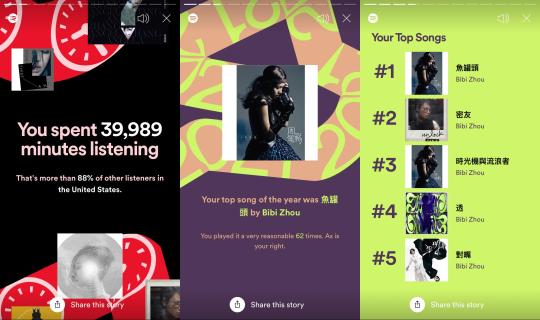
I had Spotify premium for a good chunk of the year, so now I really feel like I got my money’s worth! So yay for that.
I am not surprised to see 鱼罐头 at #1. I listened to that album a lot, and with 鱼罐头 being the first song on the album, it just makes sense. 密友 and 透 are a little more surprising to see. I remember not loving them earlier in the year, but as I heard them more and more, they grew on me a lot. I was a little surprised that no Tanya Chua songs made it into the top 5 because I’ve listened to her a lot throughout the 2nd half of the year.

At first I was so surprised to see kpop! I used to be into kpop before I started listening to Chinese music. But I realized that I still sometimes listen to kpop with my friend who likes it.
The middle is a little hard to read, so I’ll type it out:
Truth: The artist you binge-listened to the most was Bibi Zhou.
Lie: Your #1 Spotify playlist of the year was Release Radar.
Truth: The artist who appeared most in your playlists was Tanya Chua.
The lie was pretty obvious seeing as I rarely look at Release Radar.
Bibi Zhou doesn’t actually have that many monthly Spotify listeners, so I don’t think being in the top 0.01% of listeners is that impressive.
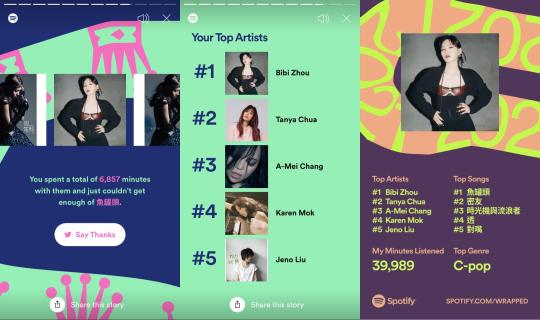
6,857 minutes ~ 114 hours :-O
I was surprised by my top 3-5. I would probably have guessed Sandy Lam over A-Mei. Karen Mok makes sense now that I’m thinking about it because I get her songs stuck in my head all the time. I would have thought 孙盛希 or 林宥嘉 would be #5 also.
Below are some of my other top songs from the personal playlist Spotify put together. I’ll list them out under the cut for your convenience.
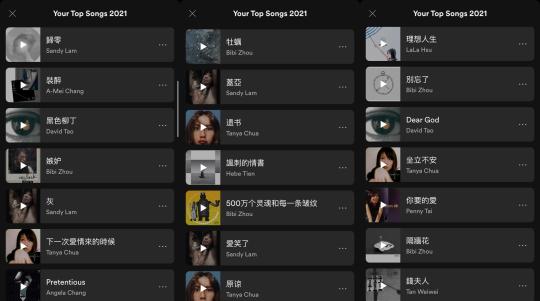
I observed that my top songs playlist really mirrors what I was listening to during the first half of the year. This checks out because 1) Spotify Wrapped apparently only includes through October and 2) I spent a lot more time listening to music in the first 6 months of 2021.

In your Chinese studies you’ve probably learned: 红色、橙色、黄色、绿色、蓝色、紫色、灰色、白色、黑色、咖啡色、粉红色
But there are so many beautiful colors out there! Let’s learn some more. These are color terms I’ve come across outside Chinese class.
In general you can indicate a light shade with 浅 and a dark shade with 深. I have also seen 墨 for dark and 淡 for light, but when I Googled various color terms, there were more results for 浅 and 深 than 淡 and 墨.
I spent way too much time messing with HTML to color the text to match (except for the shades of white).
- 褐色 hèsè - brown
- 橘黄色 júhuángsè - orange
- 奶油色 nǎiyóusè - cream
- 金黄色 jīnhuángsè - gold color
- 朱红色 zhūhóngsè - vermilion
- 米色 mǐsè - beige
- 棕色 zōngsè - brown
- 青色 qīngsè - cyan / blue-green
- 灰白 huībái - light gray / ash-colored
- 蔚蓝 wèilán - azure / sky blue
- 纯白 chúnbái - pure white
- 雪白 xuěbái - snow white
- 洁白 jiébái - spotlessly white / pure white
- 漆黑 qīhēi - pitch-black
- 铜色 tóngsè - copper
- 乌黑 wūhēi - jet-black / dark
- 靛色 diànsè - indigo (color)
- 金色 jīnsè - golden / gold (color)
- 银色 yínsè - silver (color)
Here are some single characters I’ve seen as well. Some of these are commonly used in names, like 彤 and 丹.
- 彤 tóng - red
- 丹 dān - red / pellet / powder / cinnabar
- 缇 tí - orange-red silk / orange-red colored
- 赤 chì - red / scarlet / bare / naked
- 碧 bì - green jade / bluish green / blue / jade
- 翠 cuì - bluish-green / green jade
- 皓 hào - bright / luminous / white (esp. bright white teeth of youth or white hair of old age)
- 颢 hào - bright / white
- 玄 xuán - black / mysterious
彤, 丹, and 缇 are all described as a red-orange color. I’m not really sure of the difference, so I just made them all the same shade. I’m also unclear on exact distinction between 褐色 and 棕色. Image search results certainly suggest that they are used differently. Not sure how 咖啡色 fits in either.
I stumbled across this giant Wikipedia table with many beautiful colors that you can check out to learn more!
Eason Chan is an iconic Hong Kong singer with many Cantopop and Mandopop albums. I first heard this song on Youth With You 3 when it was covered in the first performance round. Honestly I didn’t think their cover was that good…but I could tell instantly that I would like the original version of the song. I guess that says a lot about the quality of this song! It’s a rock song that starts somber and slow but then quickly builds. Sadly this song isn’t on US Spotify (there are covers though, as well as another great Eason Chan song with a title that has a similar vibe 《陪你度过漫长岁月》). Really the only flaw is that it’s a short song at only a bit over 3 minutes, so I’m always left wishing it were longer!
陈奕迅 (Eason Chan) - 让我留在你身边
我从来不说话
因为我害怕 没有人回答
我从来不挣扎
因为我知道 这世界太大
挣扎 zhēngzhá - to struggle
太多时间浪费 太多事要面对 太多已无所谓
太多难辨真伪太多纷扰是非在你身边是谁
辨 biàn - to distinguish / to recognize
真伪 zhēnwěi - true or bogus / authenticity
纷扰 fēnrǎo - turmoil / unrest / disturbance
是非 shìfēi - right and wrong / quarrel
最渺小的我 有大大的梦
时间向前走 一定只有路口没有尽头
纷纷扰扰这个世界 所有的了解
只要 让我留在你身边
渺小 miǎoxiǎo - minute / tiny / negligible / insignificant
最渺小的我 有大大的梦
我愿意安静的活在每个有你的角落
如果生活还有什么 会让你难过
别怕 让我留在你身边 都陪你度过
度过 dùguò - to pass / to spend (time) / to survive / to get through
最渺小的我 最卑微的梦
我发现这世界没有那么那么的不同
现实如果对你不公别计较太多
走吧暴风雨后的彩虹
卑微 bēiwēi - lowly / humble
不公 bùgōng - unjust / unfair
计较 jìjiào - to bother about / to haggle / to bicker / to argue / plan / stratagem
暴风雨 bàofēngyǔ - rainstorm / storm / tempest
也许会落空也许会普通
也许这庸庸碌碌的黑白世界你不懂
生命中所有的路口 绝不是尽头
别怕 让我留在你身边 都陪你度过
落空 luòkōng - to fail / to fall through / to come to nothing
庸庸碌碌 yōngyōnglùlù - ordinary / mediocre

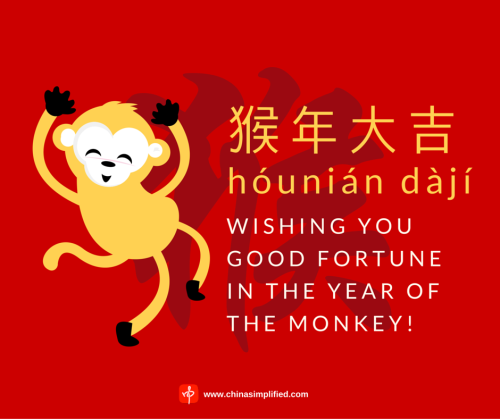
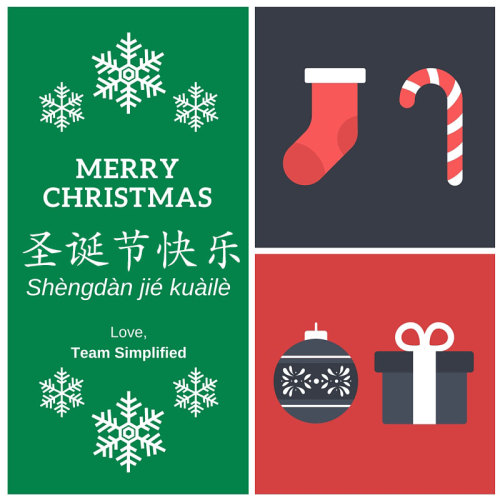
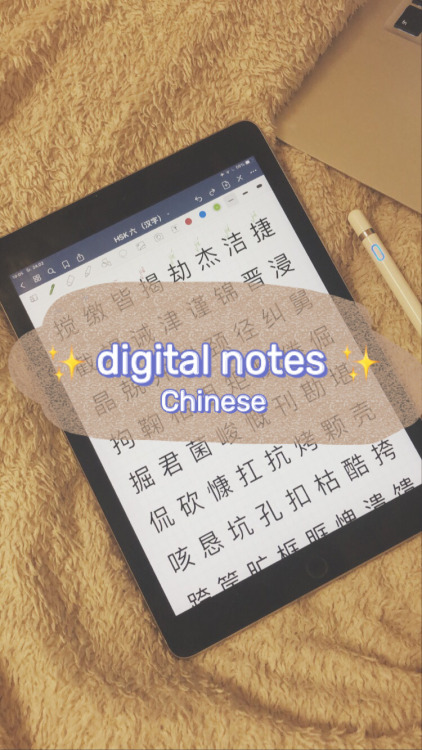
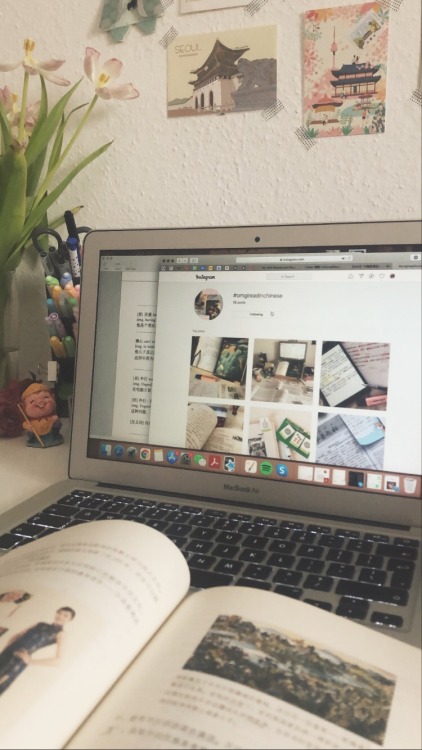

![Japanese and Chinese study time! [ & ] Japanese studygram: himekostudies Chinese studygram: za Japanese and Chinese study time! [ & ] Japanese studygram: himekostudies Chinese studygram: za](https://64.media.tumblr.com/4011d2f2ee6f812db7479c2b6aa8c86c/b947290bb3764095-c9/s500x750/2dd1ce8b9d015912ab31c76c1693f47a8dd213b0.jpg)
![Japanese and Chinese study time! [ & ] Japanese studygram: himekostudies Chinese studygram: za Japanese and Chinese study time! [ & ] Japanese studygram: himekostudies Chinese studygram: za](https://64.media.tumblr.com/66820e598b2ae2b93eca8efcccecf93e/b947290bb3764095-2c/s500x750/cb2df177dc7d0df9dd3fe2ca6b3d4ddd3ea386cb.jpg)



